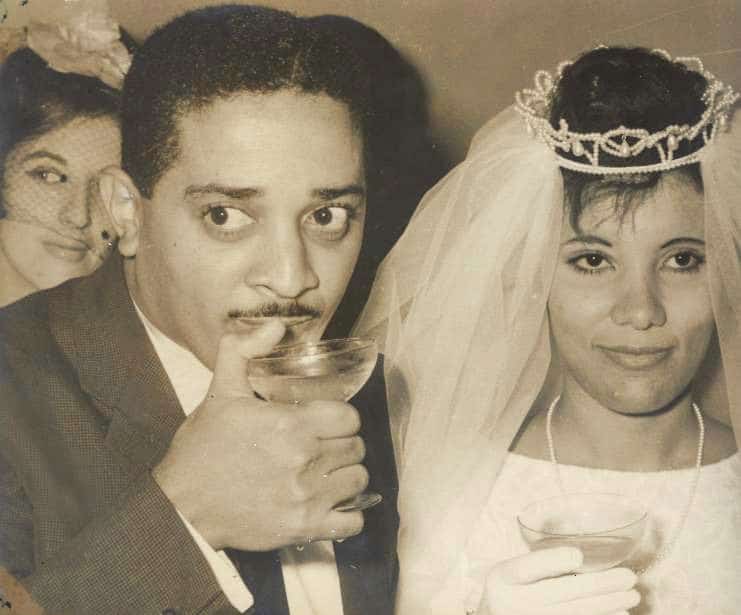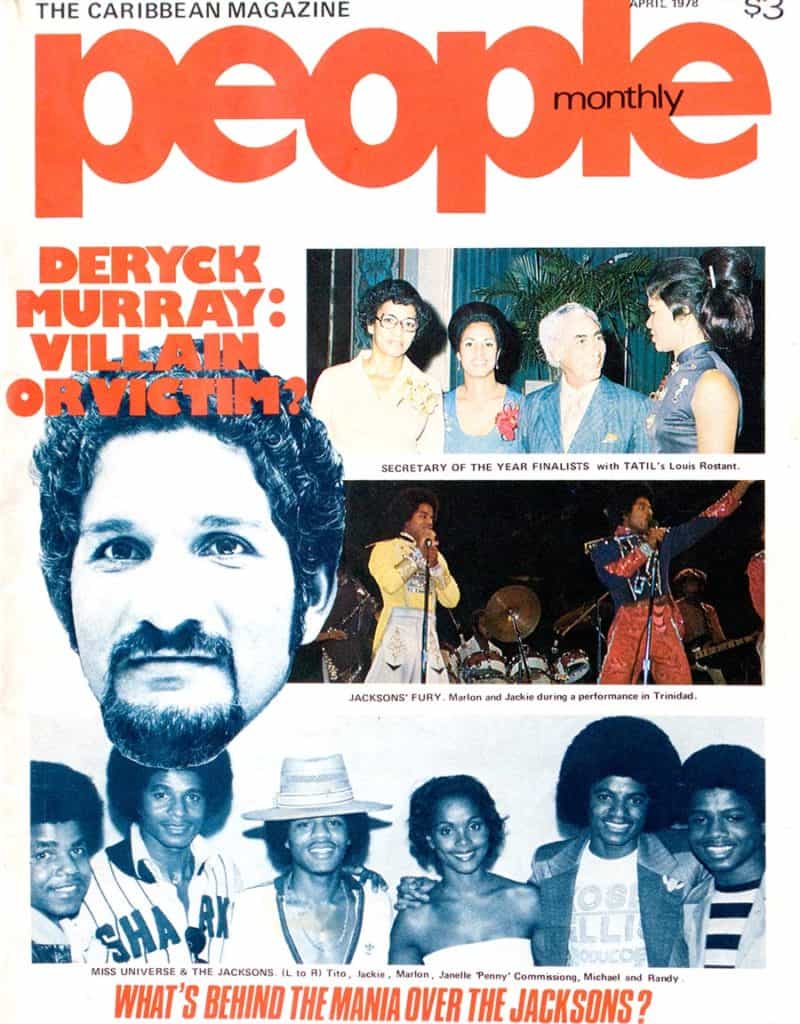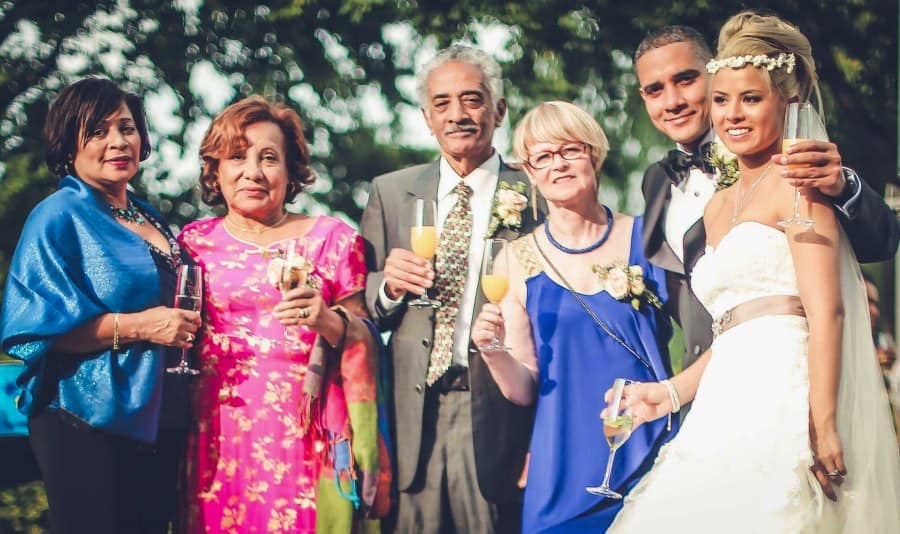
Above: Owen and Rhona Baptiste on their wedding day. Photos courtesy Rhona Baptiste.
BitDepth#1267 for September 17, 2020
Owen Baptiste, who passed last week, was not my friend at any point, but at a formative point in my earliest efforts as a journalist, he was a mentor.
To be clear, I wanted to be published in People Monthly, the lifestyle publication he produced for years, so very badly that I offered up my first effort as a teenager when Inprint was still in a walk-up behind Semp Records on Mucurapo Road.
I failed, but getting into the glossy publication, which sparkled as a local product alongside international publications on the magazine racks at HiLo grocery stores, remained a grail quest for me.
I finally got a chance to sell a story when The Jacksons visited Trinidad and Tobago in 1978 and I managed to worm my way into the Martineau brothers’ orbit via my cousin, Alfred Aguiton, whose new agency AMPLE, was handling the publicity for the event.
I count that coverage as the official start of my career as a journalist. I’d written for more than a year by then and after finding myself the only photographer in a room with The Jacksons and newly crowned Miss Universe Janelle ‘Penny’ Commissiong, I got myself even deeper into the background of the tour by sharing the exclusive photos of them posing with Epic Records executives.
Surprisingly often, I’d get cover photos, long stories in the magazine, even longer conversations about the work and then; eventually, it all collapsed.
The result was a multi-page story inside the April 1978 issue of the magazine, photos on the cover and a tentative relationship with Baptiste, as irascible and temperamental a journalist as any I’ve ever encountered.
For two years we went back and forth. I’d propose stories, many inspired by my dotage on the immersive journalism of George Plimpton and Tom Wolfe and he’d shoot them down, often summarily.
Surprisingly often, I’d get cover photos, long stories in the magazine, even longer conversations about the work and then; eventually, it all collapsed.
At the time, I couldn’t quite understand it. I’d shot extensively and badly for a planned Christmas cover at the Baptiste home, spending time in the family’s pool with the models and generally being an unprepared diva and producing no usable photos, but that didn’t break us.
Years later, I realised the breaking point came after Baptiste offered me a job, and I declined. I never quite understood why, but the frost set in quickly and solidly after that.
His wife Rhona, ever the patient mediator, tried to cushion the blow, but there was no mistaking my uncomfortable and ultimately untenable position as an outsider at the publishing house.
We never quarreled, but except for some published photos and a short lived column I wrote for Willys Marshall who was editing You Magazine for Inprint, my time with Baptiste was over.
In my life, I’ve managed to accumulate two high-quality nemeses. Owen Baptiste was one, and after working testily with him on The Last Carnival, I counted Derek Walcott as the other.
After winning his MacArthur Prize, I’d seen Walcott at an event and extended my hand to congratulate him. He slapped it away.
Years later, after I’d fallen out with the TT Guardian, I’d written to Baptiste asking about contributing to the Express. He never responded directly, but sent a message through his secretary, whom I’d been pestering, that there was “no need for me at the Express.”
The slapped hand was easier to take.
I went on to spend several years writing a rather wide-ranging column at the Catholic News under editor Fr Peter Nicholas. Curiously, when Baptiste left the Express in the 70’s, he became an editor there.
I would never speak with Owen Baptiste again, not in rancour, but because our orbits simply never intersected again, not even when he returned to Trinidad and set up a computer-driven project that I found interesting by the reports on it, but never visited.
Having Baptiste and Walcott dismiss you sets a high bar for antagonists, though their largely passive ignoring of my presence wasn’t a warzone.
Their lofty benchmark ensured that I would never take lesser assaults very seriously. If a man is defined by his friends, he is sharpened by his enemies, and I found none who could reach that high-water mark, despite their best efforts.
I took many steps up to becoming a journalist, but there was no bigger or more demanding jump than the one that Owen Baptiste demanded of me at Inprint.
When that era ended, the past was razed, but never forgotten.
I remain grateful for that opportunity.
When I asked Rhona Baptiste for images of her late husband to accompany the web version of this column, like a lifelong writer, she thought I’d meant the question metaphorically. She did send some photos, but first responded with this recollection.
“Guess it’s what my mom saw in him when he first visited our home in Tunapuna.”
“They were images of Respect; Loyalty; and yes, his sexual appeal. She was delicately asking: ‘could you handle it?’ Of course I could and did, hopefully.”
“But overriding that was a Love that was selfless devotion to Family, to Work and to Others. [I] guess the image I grew to love more and more each day was his uncaring about fame and material possessions.”



